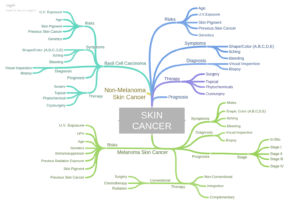I agree that Immunotherapy Can Be Transformative. But Are Yervoy, Keytruda, Nivolumab, “Transformative” in anything but the high cost of cancer therapy?
The media too often falls into the trap of hyping cancer therapies. While the immunotherapies Yervoy, Keytruda and Nivolomab may extend the overall survival of a small number of cancer survivors, these expensive chemotherapies
- have serious potential side effects
- are limited in Overall Survival and remission for the vast number of survivors
- are NOT curative
Click the image below to learn more about skin cancer-

Melanoma is a complicated cancer. Saying these therapies are “transforming” oncology is like saying the narrowing of field goal post in the NFL transformed football.
Do you even remember when the NFL first narrowed the width of goal posts? They want to do it again...
Yes, these drugs are another therapy for certain melanomas, lung cancers, and melanoma that have metastasized to the lungs. A small number of cancer patients have the exact molecular cancer make-up to benefit from Yervoy, Keytruda or Nivolomab. Unfortunately, immunotherapies only allow remissions for a limited time. These “transformative” chemotherapy regimens are not curative.
My experience as a cancer patient and cancer coach is that the key to living with metastatic melanoma is integrative therapies to combine the best of both conventional and non-conventional therapies.
Sorry if I am sounding a bit negative. My cousin, Peter Conard, 52, passed away last week. Peter was diagnosed with non-small cell lung cancer two years ago. Peter was a 52 year old non-smoker and one of the healthiest guys I know. Peter’s cancer went into remission when he went on Yervoy. Peter was determined to beat his cancer… Peter’s cancer experience was not transformative.
To learn more about both conventional and non-conventional cancer therapies, scroll down the page, post a question or comment and I will reply to you ASAP.
Thank you,
David Emerson
- Cancer Survivor
- Cancer Coach
- Director of PeopleBeatingCancer
“Melanoma can spread to parts of your body far away from where the cancer started. This is called advanced, metastatic, or stage IV melanoma. It can move to your lungs, liver, brain, bones, digestive system, and lymph nodes. Most people find their skin cancer early, before it has spread. But others find out they have the disease when it’s in an advanced stage. Some people find out it has spread after they’ve had a melanoma removed, sometimes years later.
Melanoma spreads when the tumor’s cells travel through your body’s tissues, blood, or lymph nodes. They can settle in your organs and keep growing there. They can do this because they’re sneaky. Every day, your body makes cancerous cells…
Treatments for Advanced Melanoma
In most cases, treatment can’t cure advanced melanoma. But some can help you live longer and feel better. The goal of any therapy you get will be to shrink or remove your tumor, keep the cancer from spreading further, and ease your symptoms…
Surgery. This is the main way to remove melanoma from the skin and lymph nodes. You might also have an operation on organs where the cancer has spread. There’s no guarantee your surgeon will get all of it. Some melanoma is too small to see, even with high-tech scans.
Radiation. Your doctor might recommend radiation to kill any cancer cells that have been left behind after surgery or if melanoma spreads to your brain or bones. It can also relieve pain from the disease or treat melanoma that comes back over and over.
Immunotherapy or biologic therapy. These drugs help your immune system find and attack cancer cells. Depending on the ones you take, you might have to go in for treatment every 2, 3, or 4 weeks.
Your doctor might want you to take more than one drug. Some studies show that people who do have fewer side effects.
The flip side of immunotherapy is that sometimes these drugs cause your immune system to attack healthy organs. Then you’d need to stop melanoma treatment and take drugs to stop the attack.
Targeted therapy. These drugs turn off the genes in melanoma cells that make them grow out of control. Targeted therapy can do a good job at first, but it tends to stop working in time. Then you’d need to try another treatment
Chemotherapy. Chemo drugs go through your whole body and attack more rapidly dividing cells, like cancer cells. You get this treatment in cycles that last a few weeks. After a cycle, you have time off to let your body recover.
Chemo can shrink the cancer, but chances are it will start growing again after a few months and you’ll need more treatment. Immunotherapy and targeted therapy usually work better.
Some chemo drugs can damage your nerves and cause pain, burning, tingling, or weakness or make you more sensitive to heat or cold…”
“It took some 700 patients and extended the trial to 2010. In the end, fewer than 10% met standard criteria for tumor shrinkage. But 23% survived at least three years, making the drug the first to ever show a survival benefit in patients with advanced melanoma. The drug, now owned by Bristol-Myers and known as Yervoy, was approved in 2011.
The challenge was to widen the benefit to more patients and more cancers.
The disease attracting intense interest is lung cancer, which causes more than 200,000 deaths a year in the U.S.”



